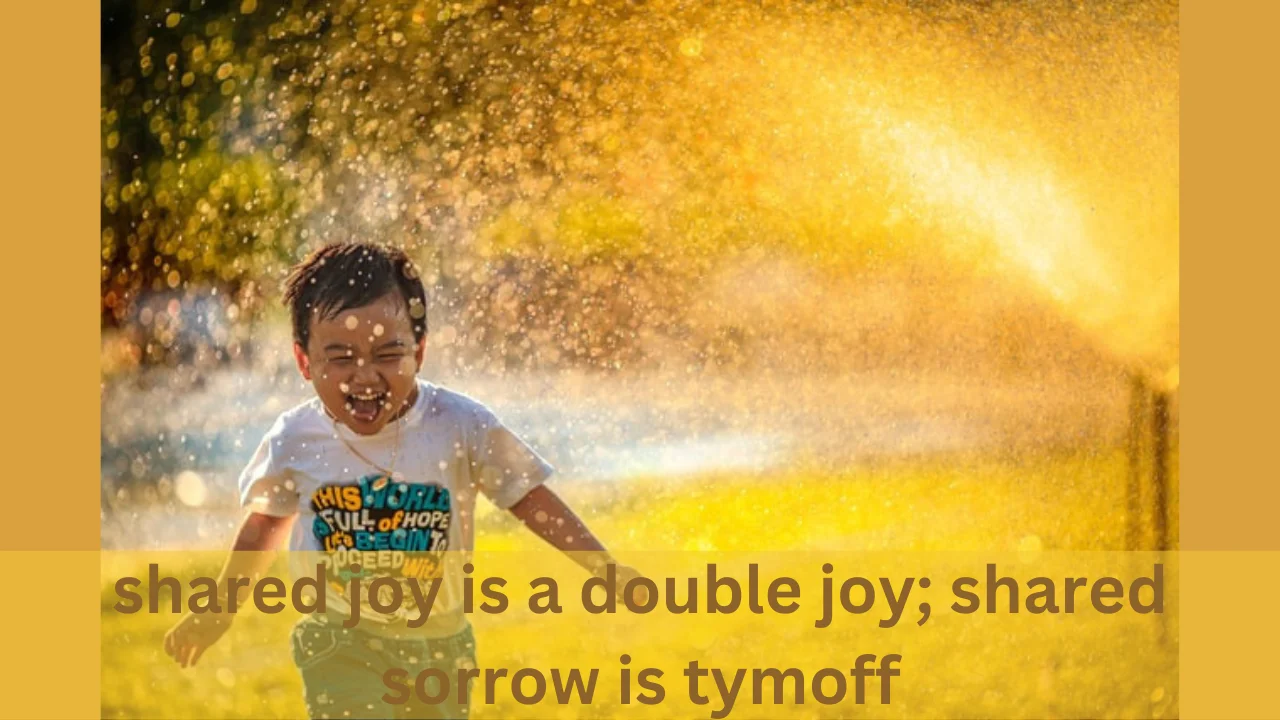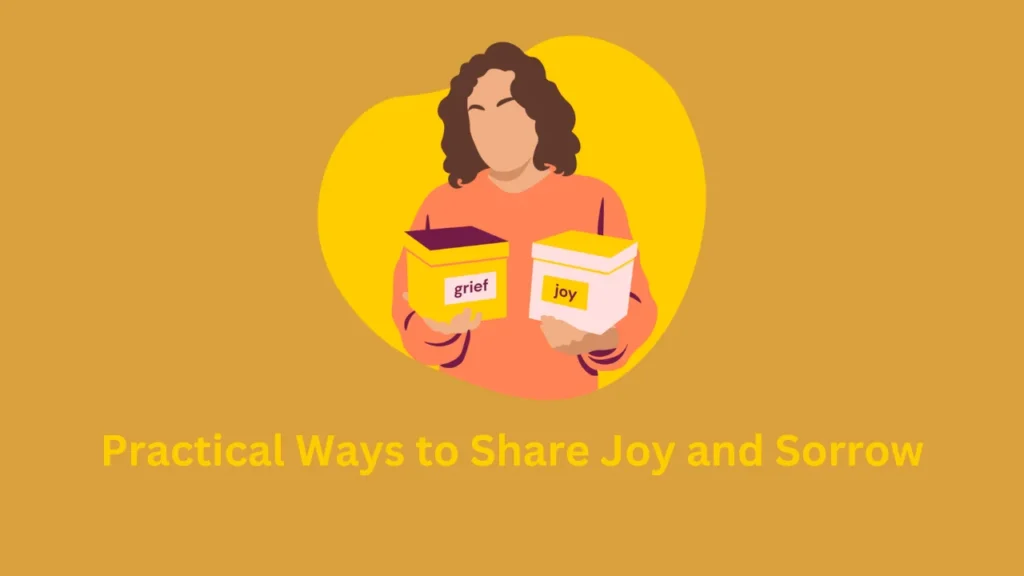Shared Joy Is a Double Joy; Shared Sorrow Is Tymoff

Human emotions are complex, but one thing that has remained constant through centuries is the value of sharing. Whether it is joy or sorrow, our emotional experiences are deeply influenced by how we relate to others. The phrase “shared joy is a double joy; shared sorrow is tymoff” beautifully captures this essence. It signifies the magnification of happiness and the mitigation of grief when shared with others. Let’s explore this concept in more depth and understand why sharing emotions plays such an important role in our lives.
What is meant by the quote “shared joy is a double joy; shared sorrow is tymoff”?
The quote “shared joy is a double joy; shared sorrow is tymoff” emphasizes the power of human connection in amplifying happiness and easing pain. When joy is shared with others, it multiplies, enhancing the experience and creating a bond of celebration. On the other hand, sharing sorrow, referred to as “tymoff” (a term that seems to imply relief or lightening of burden), helps to lessen the weight of grief. The act of sharing both happiness and hardship with others creates a sense of solidarity and emotional support, making the highs of life more fulfilling and the lows more bearable. In essence, this quote underscores the importance of companionship in both joyful and sorrowful times.
Read Also: Chantal Nchako: Cameroonian Actress and Director
Understanding the Meaning of Shared Joy
The concept of “shared joy is a double joy” stems from the idea that happiness multiplies when we share it. Think about moments of personal success, like getting a promotion or celebrating a birthday. The joy you feel during these moments is wonderful, but it becomes even more fulfilling when shared with loved ones. When others join in your celebration, they contribute to the emotional energy, amplifying your happiness.
Sharing joy creates a sense of togetherness and strengthens relationships. This is because positive emotions like joy foster social bonds and build trust. In fact, scientific studies suggest that people who share their positive experiences with others experience higher levels of overall life satisfaction. Thus, when we embrace the idea that “shared joy is a double joy; shared sorrow is tymoff,” we recognize that the act of sharing is a powerful tool for enhancing well-being.
The Role of Shared Sorrow in Easing Grief
While joy is amplified when shared, sorrow, on the other hand, diminishes. The second part of the phrase “shared joy is a double joy; shared sorrow is tymoff” refers to the idea that sharing sorrow reduces its burden. The term “tymoff” here seems to imply relief or a reduction in the weight of sadness. Just as sharing happiness brings people closer, sharing sorrow helps us heal and cope with our grief.
When we are dealing with sorrow or emotional pain, keeping it bottled up inside often intensifies the distress. However, when we confide in others, express our feelings, or simply lean on someone for support, the emotional burden lightens. Studies show that sharing feelings of sadness with empathetic listeners promotes emotional healing. This is because empathy validates our emotions, making us feel understood and less isolated in our struggles.
The Science Behind Sharing Emotions
There is a psychological and scientific foundation to the idea that “shared joy is a double joy; shared sorrow is tymoff.” The brain releases feel-good hormones like oxytocin and dopamine when we experience positive emotions, and this effect is heightened when we share these feelings with others. This hormonal response explains why shared joy feels more intense than individual joy.
Similarly, when we share sorrow, the brain responds differently. Cortisol, the stress hormone, decreases as we express and discuss our feelings. This response reduces the intensity of the negative emotions and allows us to process them more effectively. By sharing sorrow, we are not just seeking sympathy but are also engaging in a process that helps us manage emotional stress.
Social Bonds and Emotional Sharing
The concept of “shared joy is a double joy; shared sorrow is tymoff” also highlights the importance of social relationships. Humans are inherently social beings, and our emotional well-being is closely tied to our interactions with others. This becomes especially evident when we experience life’s highs and lows.
When we share our emotions, we open ourselves to deeper connections with those around us. Joy, when shared, often leads to celebrations, bonding, and a sense of collective achievement. Sorrow, when shared, often leads to empathy, support, and a sense of unity in adversity. Both forms of emotional sharing enhance our relationships and strengthen the social fabric that supports our mental and emotional health.

Practical Ways to Share Joy and Sorrow
Now that we’ve explored the meaning behind “shared joy is a double joy; shared sorrow is tymoff,” let’s consider practical ways to incorporate this into our lives. Sharing joy can be as simple as expressing gratitude or celebrating milestones with friends and family. Acts like hosting a gathering, sharing good news, or even posting about it on social media can double your happiness.
On the other hand, sharing sorrow requires vulnerability but is equally important. Reaching out to a friend or family member when you’re feeling down can alleviate some of the emotional weight. If face-to-face interaction feels difficult, even writing about your feelings in a journal or speaking to an online support group can provide relief.
Similar quotes that emphasize the value of sharing
| Quote | Meaning |
|---|---|
| “Happiness is only real when shared.” | Joy becomes more meaningful and real when experienced with others. |
| “Grief shared is half the sorrow.” | Sharing sorrow with others lightens the emotional burden and helps us heal. |
| “A joy that’s shared is a joy made double.” | Happiness grows and feels more significant when it’s shared with others. |
| “Sorrow shared is sorrow halved.” | Sharing your pain or sorrow with someone else eases the emotional load. |
| “Alone we can do so little; together we can do so much.” | Collaboration and sharing amplify achievements and help overcome difficulties. |
| “Joy is not in things; it is in us.” | True joy comes from within, especially when shared with others. |
| “A friend in joy is a friend indeed.” | Friends who share in your happiness are genuine, and the bond strengthens through shared joy. |
| “Shared pain is lessened; shared joy, increased.” | Expressing emotions, whether positive or negative, multiplies joy and reduces pain. |
Emotional Sharing and Its Benefits
Embracing the philosophy of “shared joy is a double joy; shared sorrow is tymoff” has long-lasting benefits. Sharing positive emotions builds stronger relationships, increases social connections, and enhances overall life satisfaction. Sharing sorrow, meanwhile, reduces emotional stress, fosters emotional healing, and prevents isolation.
Reda Also: Lorice Washington Net Worth, Early Life, Education and career
Benefits of Sharing Emotions
| Shared Joy | Shared Sorrow |
|---|---|
| Amplifies happiness | Lightens the emotional burden |
| Strengthens social bonds | Fosters empathy and understanding |
| Increases overall life satisfaction | Prevents emotional isolation |
| Releases feel-good hormones like oxytocin | Reduces stress by lowering cortisol levels |
Frequently Asked Questions
What does the phrase “shared joy is a double joy; shared sorrow is tymoff” mean?
The phrase “shared joy is a double joy; shared sorrow is tymoff” means that happiness is amplified when shared with others, while sorrow becomes lighter when expressed and shared.
How can sharing joy and sorrow improve relationships?
Sharing emotions, as reflected in the saying “shared joy is a double joy; shared sorrow is tymoff,” strengthens bonds, builds trust, and creates deeper connections through mutual support.
Why is it important to share both joy and sorrow with others?
According to the idea of “shared joy is a double joy; shared sorrow is tymoff,” sharing joy enhances happiness, while sharing sorrow eases emotional burdens, contributing to emotional well-being.
Can sharing emotions affect mental health positively?
Yes, as “shared joy is a double joy; shared sorrow is tymoff” suggests, sharing positive emotions uplifts the spirit, while expressing grief can reduce stress and promote emotional healing.
Conclusion
The phrase “shared joy is a double joy; shared sorrow is tymoff” beautifully encapsulates the value of emotional sharing. By recognizing the power of connection in amplifying joy and lightening sorrow, we embrace the importance of relationships in our lives. Sharing both happiness and grief helps us build stronger social bonds, improves our mental health, and leads to a more fulfilling life.
Whether through simple acts of kindness, celebrations, or moments of vulnerability, sharing emotions with others is one of the most profound ways to nurture the human spirit. As you go through life, remember that “shared joy is a double joy; shared sorrow is tymoff.” Surround yourself with people who amplify your joy and ease your sorrow, for they are the ones who truly enrich your emotional experiences.






